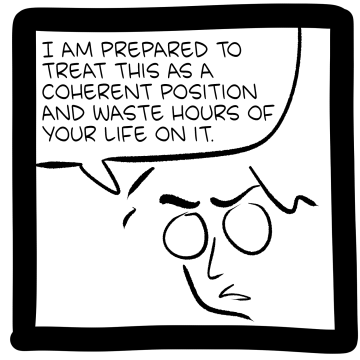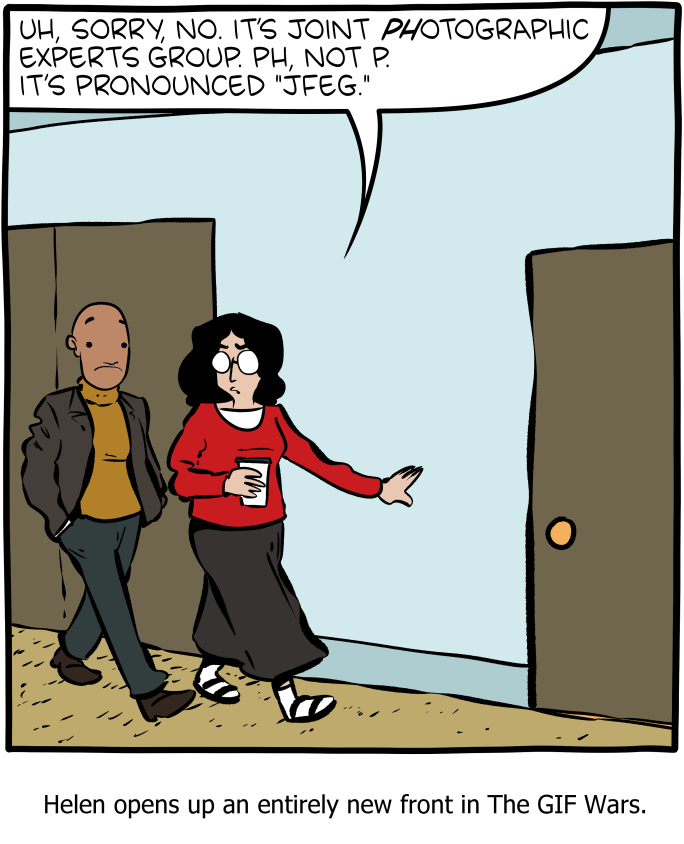this post was submitted on 27 Nov 2023
29 points (96.8% liked)
Comic Strips
12412 readers
3090 users here now
Comic Strips is a community for those who love comic stories.
The rules are simple:
- The post can be a single image, an image gallery, or a link to a specific comic hosted on another site (the author's website, for instance).
- The comic must be a complete story.
- If it is an external link, it must be to a specific story, not to the root of the site.
- You may post comics from others or your own.
- If you are posting a comic of your own, a maximum of one per week is allowed (I know, your comics are great, but this rule helps avoid spam).
- The comic can be in any language, but if it's not in English, OP must include an English translation in the post's 'body' field (note: you don't need to select a specific language when posting a comic).
- Politeness.
- Adult content is not allowed. This community aims to be fun for people of all ages.
Web of links
- [email protected]: "I use Arch btw"
- [email protected]: memes (you don't say!)
founded 1 year ago
MODERATORS
you are viewing a single comment's thread
view the rest of the comments
view the rest of the comments


As someone else pointed out already, this is untrue. While it may not have been popular in your circles, it definitely was in others. I've been saying it with a hard g as long as you have with a soft and I'm not the originator either.
They absolutely do. That's why you can sound out a word you've never seen before. You may not always be right when you do because they indicate, they don't define.
There are, there are just exceptions. For example, an e at the end of the word is silent. I'm certain you can give me a word where it's not, but there are at least six in this paragraph alone where it is.
In this logic if someone has been pronouncing a word all their life with a single pronunciation and travels to another location with a much different accent they can only now be pronouncing the word wrong.
If understanding is also the only metric then a hard g would still be preferable. Not only does a written g tend to make people lean to a hard g in my experience, but there's more words that could be mistaken for a soft g pronunciation.
Could I not argue that the original pronunciation has fallen out of favor?
Is there a time requirement for pronunciations to become archaic?
Which isn't a time that existed, as we've established
Given your stance on language this is absolutely a you problem. If the rest of us collectively decided to understand it as only with a hard g, you would not be understood and therefore be pronouncing it wrong by your own logic.
I've never had the problem of not being understood. And regardless of how long the time period was, there was a time when one guy spoke aloud the word when he invented it. You can use the new pronunciation if you like, but I use the original, as I have for 30+ years, and I will continue to do so because both are acceptable. If you don't like it, that's a you problem.
You are either a uniquely spectacular communicator or a liar. It's not for me to say which. Regardless that's not the point. If you use the soft g sound and are not understood then, by your own explanation you are saying it wrong. That's something you need to contend with.
So no time requirement on archaic then?
As is true of every word and yet I'm sure there are words you say differently than the first person. I'll bet you don't say the name of the element with the atomic number 13 the same way the man who discovered it does. Not to mention who knows how many words England took from France, mangled, and then got adjusted again in America. Who is the correct first person there, or does the first person only matter with this specific issue?
I will as well many others.
Me too! Still doesn't make yours right and mine wrong no matter how hard you try to deride it as "new" when it's barely newer than the format.
I can't stop you. I can think you ridiculous for doing so but my suspicion that this would be the only reason I would think that of you diminishes with each response you send.
Perhaps, but one seems to be falling out of favor. Just like a double space after a period or writing out words greater than ten but less than one hundred.
I could call it a moving picture and not be wrong, doesn't mean people wouldn't think me weird for doing so. I would have to deal with that the way you need to deal with what your choices cause people to think of you.
Sure, but it won't stop me from making my own conclusions just like any other thing. The same is true for all of humanity to varying degrees.
One of the most common words with a final "e" in that paragraph is "the" which not only has a final "e" sound, but has two different final "e" sounds depending on the context: "the end" uses a /ði/ pronunciation but "the word" uses a /ðə/ pronunciation. English is very stupid.
But, I agree with your assessment. English has rules, or at least patterns. "G" is most often hard, not soft, because "J" is available for the soft version, but there's no alternative for the hard version. English tends to follow patterns, and "gift" has a hard g, and it (and words based on it) are the only ones that start with "gif", so every "gif" word is hard. Because "t" (unlike "e") can't change the sounds before it, the pattern says that "gif" should have a hard "g".
If it were "gir", then there would be more debate. The word "giraffe" has a soft "g" but "girl" has a hard one, so the pattern is more muddy.
Also, people who coin words don't get to decide how they'll be pronounced. They can certainly try, but they'll often lose. There are plenty of words in English borrowed from other languages that not only sound nothing like the original language, but that sound nothing like they'd sound if they were English words. For example, "lingerie". It's a French word, but the English pronunciation sounds nothing like a French word. In fact, if someone just sounded out the word as if it were an English word, they'd probably get much closer to the French pronunciation than the awful "lawn-je-ray" which is the current accepted English pronunciation (though, they'd probably assume a hard "g" sound).
In this case, it's too bad that Steve Wilhite didn't have a background in linguistics or he would have realized that people would see "gif" and assume a hard "g". It was a losing fight from the start because he either didn't understand the assumptions people would have when they saw those letters, or he thought that somehow he could successfully fight the tide all by himself.